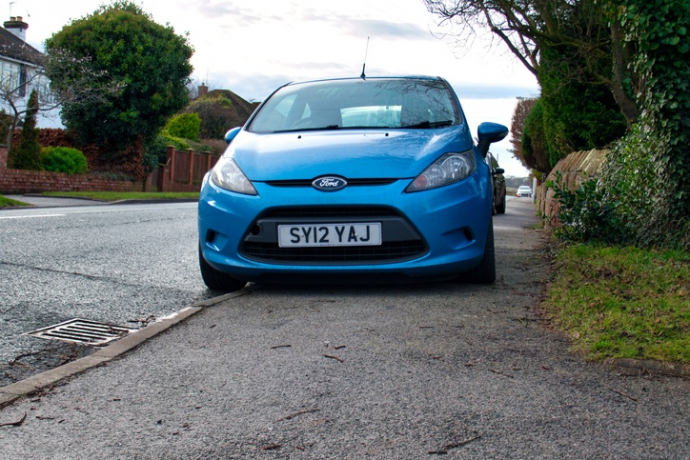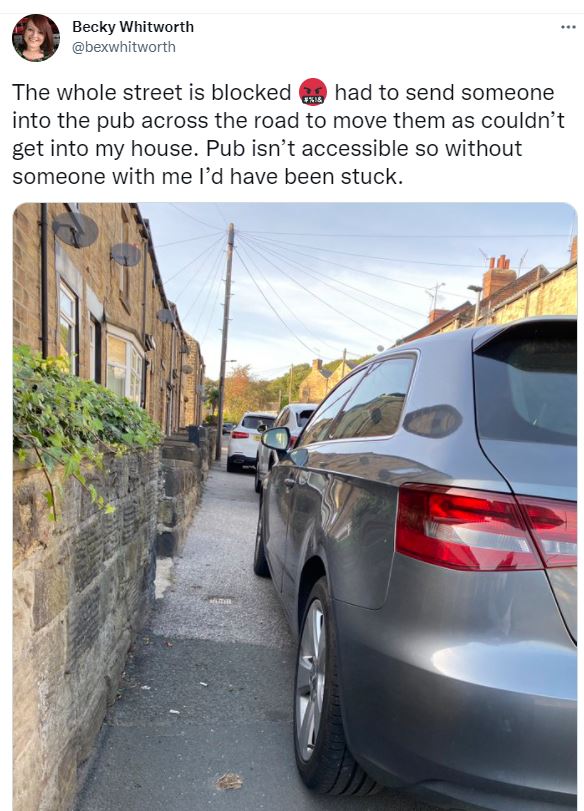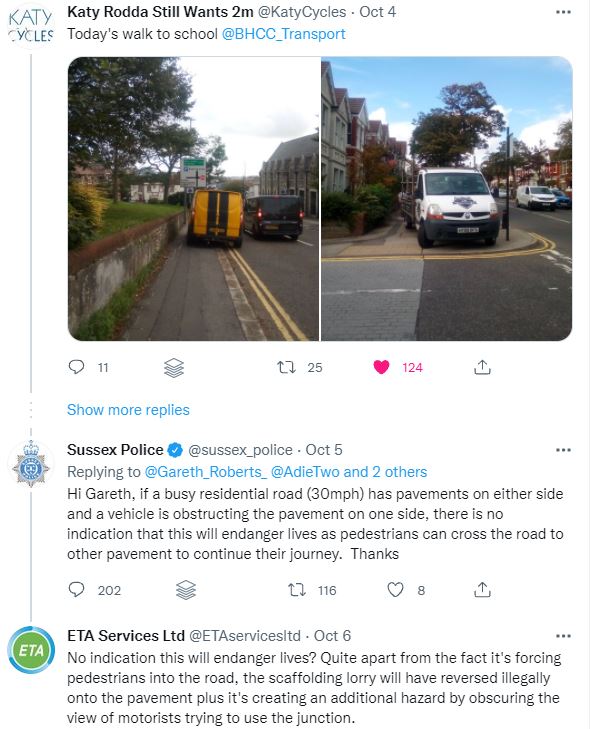
It’s been illegal to drive on the pavement since 1883. However, one of the reasons footways the length and breadth of the land have been obstructed by cars for the last 138 years is that police have to witness a car being driven on the pavement in order to enforce the law.
Pavement parking; the pandemic we refuse to tackle
In a perfect example of why pavement parking is blight, wheelchair user Becky Whitworth told Twitter how she was unable to get into her house by a line of cars parked on the pavement. All the drivers were in the local pub, which was itself was inaccessible to her.

Part of the challenge is that even the police themselves fail to recognise the danger posed by pavement parking…

Pavement parking: Dangerous and expensive
Over 80 per cent of local authorities have reported that pavement parking is a widespread problem in their area.
The findings of the most recent government consultation on pavement parking confirmed that vulnerable pedestrians are most at risk, and in particular: people with visual impairments; people who use mobility aids, including guide dogs, wheelchairs, and mobility scooters; young children and people with prams and pushchairs.
A review of surveys carried out by organisations representing disabled people, as well as cycling and walking provided evidence of pedestrians being injured or very nearly injured, because of vehicles parking on pavements. The surveys indicated that 95% of visually impaired people had had a problem with vehicles parked on pavements in the previous year. This figure rose to 98% of wheelchair users. A survey found that 32% of respondents with vision impairments were less willing to go out on their own because of pavement parking.
Pavement parking also has a negative financial impact on local authorities with one estimating that 10 to 20% of its pavement repair budget of £500,000 is spent repairing pavements damaged because of pavement parking each year.
The reluctance of government to deal with pavement parking may be due in part to lobbying by the motoring lobby. The AA described talk of a nationwide ban on pavement parking as ‘a step too far’ and a recipe for parking chaos. However, campaign groups are determined to see a change in the law. Let’s pedestrianise pavements once and for all.
The ethical choice
The ETA was established in 1990 as an ethical provider of green, reliable travel services. Over 30 years on, we continue to offer cycle insurance, breakdown cover and mobility scooter insurance while putting concern for the environment at the heart of all we do.
The Good Shopping Guide judges us to be the UK’s most ethical provider.
Vincent Edwards
The usual excuse given for parking on the pavement is “if I didn’t park on the pavement I’d block the road to a fire engine”. Apparently the option of not parking in that street at all is not to be considered. And it is true that after decades of complacency and looking the other way by the authorities, a total ban on pavement parking would cause considerable disruption in some areas.
Yet only last week I watched a driving instructor direct his pupil onto the pavement in a location where there was plenty of room to park fully on the road. Little wonder that so many motorists appear to think that unless they have put at least two (preferably four) wheels on the pavement, they are not properly parked.
Vincent
Where do we think people will park their new battery powered cars? It’ll be right next to their house, on the pavement, so they can charge them. It’s alright saying don’t park on the pavement but is parking on the road the answer, or is the answer fewer cars, better, publicly owned, community transport?
Tim Earl
The AA said “an outright ban could lead to unintended consequences with parking chaos becoming more widespread. A better solution would be for councils to make a street-by-street assessment and where pavement parking could be allowed it be clearly marked and signed”
So they want to take pavements away from pedestrians and give them to cars? Nice one, AA!
The “parking chaos” would mainly affect car drivers, and they might get the message that there are too many of them. The long-term answer is less private cars, which would free up road space for emergency and essential vehicles (and bikes, buses etc.).
Russ Taylor
Maybe we should encourage the use of the Parliamentary ‘table a motion’ procedure to amend existing legislation to enable vehicles on the pavement to be clamped for doing so. If an appropriate amendment could be drafted and a willing MP prepared to table it, the amendment would become law 28 days later.
This would enable Local Council Traffic Wardens and other contracted clamping organisations to disable vehicles and/or fine their owners using standard PCNs if found illegally parked on a pavement. E.g. if you park on the pavement in our Borough, it will hurt your wallet!.
What we need are the tools to encourage behaviour change. Introducing a small change in the law that allows an offender to be fined for an offence is a start.
John Fletcher
A simple new law allowing anyone to “key” the paintwork of any vehicle parked on the pavement would soon rectify the situation!
(Might also cause a few punch-ups, mind!)
Keith Reeder
“police have to witness a car being driven on the pavement in order to enforce the law.”
Not true. The offence as defined in the RTA 1998 criminalises driving:
“on to or upon any common land, moorland or land of any other description, not being land forming part of a road”
There is NO requirement to witness car being driven on the pavement: which – to be clear – WOULD BE IN THE STATUTE if there was a legal requirement for a police officer to see the car being driven onto the pavement.
The evidence that a vehicle has been driven “on to or upon” is there by simple dint of the fact that there is a car UPON the pavement. The car couldn’t be there unless it has been driven on to or upon the pavement, and the burden of proof does not include seeing the offence taking place.
Yes, there is the problem of proving who was driving, but that IS NOT the same as “having to witness” the car being parked on the pavement.
The ETA
It is an offence to drive onto the pavement, whether with intention to park or not. Because this is a criminal offence, as opposed to the vast majority of civil parking offences, it is enforceable by the police, not the local authority. However, the police rarely, if ever, enforce this particular law, partly because a police officer has to witness a driver actually driving on to the pavement. A car parked on the pavement is not sufficient proof it was driven there. It could have been dropped there by crane, for instance. Unlike for a speeding offence a police officer has no power, in relation to driving on the pavement, to insist that the keeper of a vehicle tells of who was driving at any particular time. For this and other reasons the police generally don’t enforce this particular law and tend to refer complainants to local authority parking enforcement officers, who have few mechanisms in which to tackle the problem. (https://www.forbes.com/sites/carltonreid/2019/04/02/pavement-parking/?sh=17ddb4fd1635)
Patricia Richardson
Many people who park on pavements in my area have drives for 2 cars, but excuse. Ant be bothered opening the gates?
When I wrote to the council as a Ratepayer, about pavements being repaired, don’t do unless it’s dangerous.
Their excuse, people have so many cars now in families, impossible to Park.
I see blind people with dogs, unable to get down the road, plus other people and myself having to use the road to get passed and I live on a very busy main road.
Now we have bikes, scooters, mobility scooter, who think we have to give way to them as they come charging at you.
I have a 2 metre pavement in front of my house, and requested a cut out to park my mobility car. But was refused it would be dangerous as a bus stop just down the road?????.
Good job I don’t have a EV double yellow lines with Kerb markings.
Where would I charge my car.
Everyone goes on about EV, but impossible for some people unless structure in place.
Impossible to park anywhere in my area
I have given up trying to communicate to local council. Just don’t care.
clarke
I emailed Merton Council, with appropriate photos, builders’ vans parked on the pavements of busy, and bendy Copse Hill, down which cars illegally speed and to my surprise 20mph limit signs were installed and the builders stopped parking on the pavement! Worth complaining, politely, sometimes.
Colin Kenning
My suggestion is to start a campaign to get 100000 votes for a discussion in parliament. What would be the essence of the proposal? I suggest a simple rule. If there is less than 1 metre space remaining on the pavement the parking is illegal. 1 metre (or 3 feet?) is sufficient passage for most pushchairs, wheelchairs, blind people. And allow parking officers to enforce it with a small tape measure and a digital photo to issue fixed penalty notices. No need for police intervention.
Chris Johnson
A few years ago, whilst pushing our pushchair with our child in, we encountered a car parked on the pavement blocking our way. It was alongside a very busy A road. At the very same time, a beat bobby came the other way. He offered to help, and then lifted the pushchair onto the bonnet and wiggled it so that its wheels scratched the paint. Then he lifted the pushchair off and stopped the traffic so that we could pass safely!
Chris
I used to regularly visit https://pedestrianliberation.org/
He’s gone quiet, but he might just need encouragement.
Maddie
Taking a friend out in his wheelchair we discovered an SUV completely blocking the pavement. We tried to cross to the other side, but as it was a cobbled street, it became almost impossible for the wheelchair, and my friend nearly fell out!
Andy
Terrible response from the police.